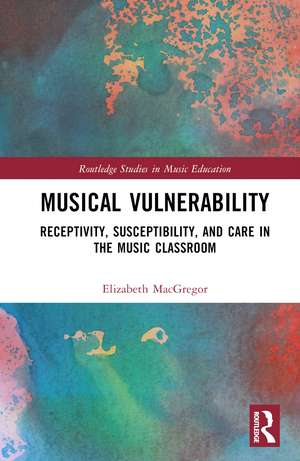Musical Vulnerability: Receptivity, Susceptibility, and Care in the Music Classroom: Routledge Studies in Music Education
Autor Elizabeth MacGregoren Limba Engleză Hardback – 24 dec 2024
Drawing on existing vulnerability studies, this book evaluates how music-making can foster both positive receptivity and negative susceptibility, depending on its delineation of self-identity, social identity, and space, and its embodiment through aural receptivity, mimetic participation, and affective transmission. Through phenomenological, ethnographic research with teachers and pupils, it exposes how values espoused in the music classroom require the personal and interpersonal negotiation of conflicting musical expectations, identities, and abilities. It makes recommendations for music education policymakers, teachers, and researchers in diverse global contexts, suggesting the importance of developing ‘pedagogies of vulnerability’ in order to foster caring classroom music-making praxes that acknowledge music’s capacity both to heal and to harm.
Preț: 936.26 lei
Preț vechi: 1028.86 lei
-9% Nou
Puncte Express: 1404
Preț estimativ în valută:
179.17€ • 194.56$ • 150.51£
179.17€ • 194.56$ • 150.51£
Carte tipărită la comandă
Livrare economică 22 aprilie-06 mai
Preluare comenzi: 021 569.72.76
Specificații
ISBN-13: 9781032611532
ISBN-10: 1032611537
Pagini: 248
Ilustrații: 24
Dimensiuni: 152 x 229 mm
Greutate: 0.59 kg
Ediția:1
Editura: Taylor & Francis
Colecția Routledge
Seria Routledge Studies in Music Education
Locul publicării:Oxford, United Kingdom
ISBN-10: 1032611537
Pagini: 248
Ilustrații: 24
Dimensiuni: 152 x 229 mm
Greutate: 0.59 kg
Ediția:1
Editura: Taylor & Francis
Colecția Routledge
Seria Routledge Studies in Music Education
Locul publicării:Oxford, United Kingdom
Public țintă
Postgraduate and Professional Practice & DevelopmentCuprins
1. Introducing musical vulnerability: Policy, pedagogy, and phenomenology
2. Conceptualising musical vulnerability: Inherent, situational, and pathogenic vulnerabilities
3. Conceptualising musical vulnerability: Music’s institutional and (inter)personal mediation
4. Characterising musical vulnerability: Pupils’ experiences
5. Characterising musical vulnerability: Teachers’ experiences
6. Experiencing musical vulnerability: East Fen High School
7. Experiencing musical vulnerability: Ethan, Greg, Iniya, and Juliette
8. Harnessing musical vulnerability: Conclusions and implications
2. Conceptualising musical vulnerability: Inherent, situational, and pathogenic vulnerabilities
3. Conceptualising musical vulnerability: Music’s institutional and (inter)personal mediation
4. Characterising musical vulnerability: Pupils’ experiences
5. Characterising musical vulnerability: Teachers’ experiences
6. Experiencing musical vulnerability: East Fen High School
7. Experiencing musical vulnerability: Ethan, Greg, Iniya, and Juliette
8. Harnessing musical vulnerability: Conclusions and implications
Recenzii
‘An important contribution to critical music education studies, this book outlines new directions for theorising music education, most notably the concept of musical vulnerability. As MacGregor eloquently demonstrates, it is because people have powerful positive experiences of music that they can also have very strong negative experiences, and music education policy and practice must take this fundamental truth into account. As such, this book will be eagerly read by both music and education scholars internationally.’
—Anna Bull, University of York, United Kingdom
‘With insightful examples and theoretical depth, Musical Vulnerability compellingly departs from the celebratory narratives of music for individual and social betterment to insist upon a more nuanced perspective on school music education. A thought-provoking impetus to reshape music education policy, practice, and research in compassionate, relational, and ethical ways.’
—Alexis Anja Kallio, Queensland Conservatorium Griffith University, Australia
‘Grounded in solid empirical work and rigorously theorised, Musical Vulnerability offers a provocative challenge to the belief that the teaching of music is without risks. Drawing attention to music’s semantic and somatic qualities, MacGregor argues compellingly for the importance of a “pedagogy of vulnerability”.’
—Roger Mantie, University of Toronto, Canada
—Anna Bull, University of York, United Kingdom
‘With insightful examples and theoretical depth, Musical Vulnerability compellingly departs from the celebratory narratives of music for individual and social betterment to insist upon a more nuanced perspective on school music education. A thought-provoking impetus to reshape music education policy, practice, and research in compassionate, relational, and ethical ways.’
—Alexis Anja Kallio, Queensland Conservatorium Griffith University, Australia
‘Grounded in solid empirical work and rigorously theorised, Musical Vulnerability offers a provocative challenge to the belief that the teaching of music is without risks. Drawing attention to music’s semantic and somatic qualities, MacGregor argues compellingly for the importance of a “pedagogy of vulnerability”.’
—Roger Mantie, University of Toronto, Canada
Notă biografică
Elizabeth MacGregor is currently the Joanna Randall-MacIver Junior Research Fellow at Somerville College, University of Oxford. She holds a PhD in music education from the University of Sheffield.
Descriere
Drawing on existing vulnerability studies, this book evaluates how music-making can foster both positive receptivity and negative susceptibility, depending on its delineation of self-identity, social identity, and space, and its embodiment through aural receptivity, mimetic participation, and affective transmission.










